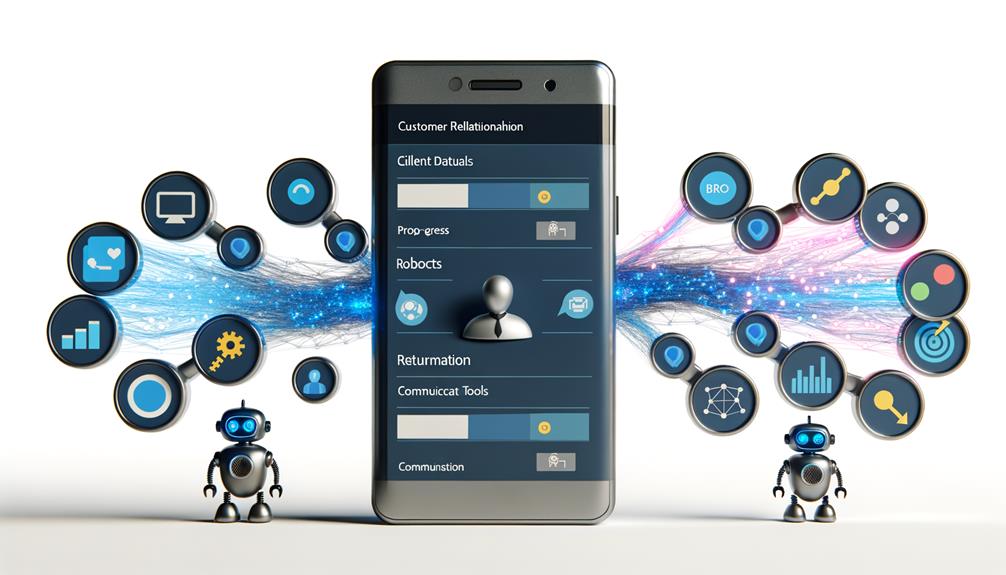AI-driven sales forecasting techniques drastically enhance your sales predictions. By leveraging machine learning models, AI can identify data patterns, automate tasks, and provide real-time insights. This leads to improved accuracy in sales forecasts and increased efficiency. By incorporating AI, you can slash forecasting errors by half and increase profitability by up to 20%. AI tools, such as Salesforce Einstein, Clari, and InsightSquared, harness predictive analytics to drive strategic decisions. If you're interested in advanced strategies, stay with us, there's so much more to learn about reaching new heights in sales.
Understanding AI in Sales Forecasting

Leveraging AI in sales forecasting, you're tapping into advanced algorithms that scrutinize large amounts of historical sales data, enabling you to anticipate future sales trends with impressive precision. Machine learning models in AI, a subset of data analysis, sift through this data, identifying patterns and trends that human analysts may miss. Using these AI-driven tools, you're not only predicting sales but also making more informed decisions about resource allocation. AI's role in sales forecasting also includes automating repetitive tasks, providing real-time insights to guarantee more accurate sales forecasting. You're also enhancing efficiency. As AI technology matures, its adoption in sales forecasting is on the rise, leading to better sales strategies and improved revenue forecasting capabilities. Embrace AI, your key to revealing customer trends and making smarter sales decisions.
Challenges in Traditional Sales Forecasting

You've probably experienced the pitfalls of traditional sales forecasting firsthand. The inaccuracies that often come with manual forecasting, the time-consuming nature of data collection, and the inflexibility of static models can all hinder your sales strategy. As we explore this topic, you'll see how these issues can impact your overall business performance.
Inaccuracy in Manual Forecasting
Despite the importance of intentions, you'll often find that manual forecasting methods can lead to overly optimistic sales predictions, resulting in inaccurate revenue projections. It's essential to recognize these pitfalls and consider how AI sales forecasting tools can help provide more accurate insights.
Here are some challenges in manual forecasting:
- Quality of data: Manual methods may lack the high-quality data needed to accurately predict future sales, hindering your ability to analyze and identify trends.
- Team morale: Inconsistent or unreliable forecasts can lower your sales team's morale.
- Market shifts: Rapidly changing market conditions can make manual forecasts outdated.
- Unpredictable sales cycles: If your sales cycles are unpredictable, it's even harder to forecast accurately.
Switching to AI-driven, predictive tools can greatly enhance your sales forecasting.
Time-Consuming Data Collection
An overwhelming amount of time in traditional sales forecasting is often spent on laboriously gathering and organizing data from numerous sources, a process that's not only inefficient but also susceptible to errors. Manual data collection methods often lead to delays, impacting the ability to generate timely and reliable sales predictions.
The challenge is to transform this time-consuming task into a more efficient process. This is where automating processes come into play. It not only saves time but also improves forecasting accuracy by minimizing human error.
Inflexibility of Static Models
While automating processes can alleviate the burden of data collection, there's another hurdle to tackle in traditional sales forecasting: the inflexibility of static models. These models often struggle to adapt to shifting market trends and fail to provide accurate sales forecasts.
- Traditional sales forecasting methods tend to be rigid, hindering accurate predicting future sales.
- Static models often overlook real-time insights, resulting in missed opportunities.
- Lack of flexibility can lead to overly optimistic forecasts or unrealized revenue.
- AI-powered sales forecasting tools offer an adaptive alternative, embracing dynamic changes in market trends.
Dynamic AI-driven forecasting, powered by AI and Machine Learning, can adapt to changing conditions. This forecasting software can analyze sales performance in real-time, providing more accurate and responsive sales projections.
Benefits of AI-Driven Sales Forecasting

You're about to see how AI is transforming sales forecasting. This technology enhances decision-making, increases profitability, and improves efficiency. Through AI, you can achieve more accurate forecasting, leading to increased revenue and customer satisfaction.
Enhanced Decision-Making Process
Harnessing the power of AI-driven sales forecasting, businesses can radically enhance their decision-making process through real-time insights into market trends and customer behavior. By utilizing AI for Sales, you're equipped with state-of-the-art predictive models. These models are capable of accurate forecasting, allowing you to anticipate market trends and allocate resources strategically.
Here are some ways AI can boost your decision-making process:
- Predictive Analytics: AI enables detailed analysis of past sales data, providing data-driven insights for future decision-making.
- Customer Behavior Analysis: AI tools can analyze customer patterns, helping tailor your sales strategies.
- Accurate Forecasting: AI can produce reliable sales forecasts, minimizing risks and enhancing strategic planning.
- Resource Allocation: AI-driven forecasts help optimize resource distribution, ensuring maximum efficiency of your sales team.
Profitability and Efficiency Increase
As you integrate AI-driven sales forecasting into your business strategy, it's worth noting that it could potentially ramp up your profitability by a significant 15% to 20%, due to the precision of data-driven decision-making. AI for Sales can accurately forecast your business's financial future through its ability to analyze vast amounts of data. This sales forecasting software can provide valuable insights that help eliminate guesswork, thereby improving critical decisions that directly affect your bottom line. With AI, you can generate personalized sales strategies tailored to your target market's buying behavior, effectively increasing profitability. Implementing AI not only promises an efficiency increase but also paves the way for a smarter, more successful business strategy.
Implementing AI in Sales Forecasting

When you're implementing AI in sales forecasting, it's worth noting that such an approach can enhance forecast accuracy by a staggering 10-20%, potentially slashing forecasting errors by half. This implementation of AI for Sales provides real-time insights that fuel agile decision-making, boosting sales productivity and enabling you to anticipate market trends with greater precision.
Here are the key benefits of implementing AI in your sales forecasting process:
- *Boost in sales productivity*: AI can increase sales productivity by up to 30%.
- *Real-time insights*: Agile decision-making becomes possible with real-time data analysis.
- *Predictive analytics*: AI allows you to anticipate market trends and adjust strategies accordingly.
- *Improved forecast accuracy*: With AI, you can reduce sales forecasting errors by a whopping 50%.
Incorporating AI into your sales forecasting certainly seems like a smart move, isn't it?
AI-Powered Tools for Sales Forecasting

In the world of sales forecasting, AI-powered tools like Salesforce Einstein, Clari, and InsightSquared are game-changers, harnessing predictive analytics to provide accurate forecasts and real-time alerts, while also offering dynamic data import capabilities that can greatly enhance sales performance. When you integrate AI for sales forecasting into your CRM like Zoho or SalesChoice, you access a thorough data analysis that can drive your strategic decision-making. These tools automate the grunt work of data processing and lead scoring, delivering precise forecasts and actionable insights. With AI, you can transform your sales performance and customer interactions, making them more data-driven. Therefore, AI in sales forecasting is not just about predicting numbers, it's about empowering your sales team with the right information at the right time.
Real-World Applications of AI Forecasting

Harnessing the power of AI for sales forecasting, you'll find a multitude of real-world applications that not only increase revenue by 10-15% but also reduce forecasting errors by an impressive 30%. AI in sales forecasting is revolutionizing how businesses analyze data and make strategic decisions.
- AI tools accurately forecast sales trends, leveraging large datasets to provide improved predictions.
- These tools offer real-time insights, propelling sales teams to act swiftly and decisively.
- A marked reduction in forecasting errors leads to reliable revenue projections.
- The result? A significant boost in revenue, thanks to AI's precise and efficient approach.
These applications are transforming the business landscape, making AI an indispensable tool in strategic decision-making and revenue growth.
Future Trends in AI Sales Forecasting

Looking ahead, you'll soon notice a powerful shift towards integrating AI with CRM systems, offering a complete view of sales data and customer interactions. This synergy allows you to analyze customers more deeply, forecasting demand efficiently.
| Future Trend | Benefit |
|---|---|
| AI & CRM Integration | Holistic Customer Insights |
| Personalized Content | Enhanced Customer Engagement |
| Automation of Tasks | Strategic Decision-making Time |
These trends highlight how you can utilize AI to generate personalized content, enhancing customer engagement. The automation of manual tasks frees up time for data-driven decision-making, enabling you to predict future trends more accurately. So, when you use AI for sales, you're not only streamlining operations but also creating a more effective, personalized, and data-driven sales strategy.
Role of AI in Risk Management

While AI's impact on sales is transformative, it's also reshaping risk management by analyzing historical data to identify potential risks and predict future market fluctuations. AI is a game-changer in managing financial risks. It empowers you to make data-driven decisions that can safeguard your bottom line.
Here's how AI boosts risk management:
- AI-powered tools predict financial risks by detecting patterns and anomalies in data.
- Machine learning algorithms flag potential risks early on.
- AI enables real-time monitoring of market conditions, enhancing risk assessment accuracy.
- By leveraging AI, your business can guarantee financial stability.
Embracing AI in risk management not only provides a safety net against market uncertainties but also optimizes your business strategies.
AI and Customer Relationship Management

In the domain of customer relationship management (CRM), AI's capabilities are revolutionizing how businesses interact with their customers, making engagements more personalized and greatly improving overall sales efficiency. AI-powered CRM tools analyze customer data to understand buying patterns and behavior, leading to targeted sales strategies.
Here's a brief overview:
| AI in CRM | Impact |
|---|---|
| Lead Nurturing | Enhances lead nurturing through personalized interactions |
| Customer Retention | Improves customer retention by understanding customer behavior |
| Sales Forecasting | Increases sales forecasting accuracy |
| Workflow Optimization | Automates tasks, streamlines workflows, and optimizes sales processes |
The integration of AI in CRM results in better customer insights, increased sales efficiency, and improved overall business performance. As a result, you're not just working smarter, but also optimizing your business's potential.



